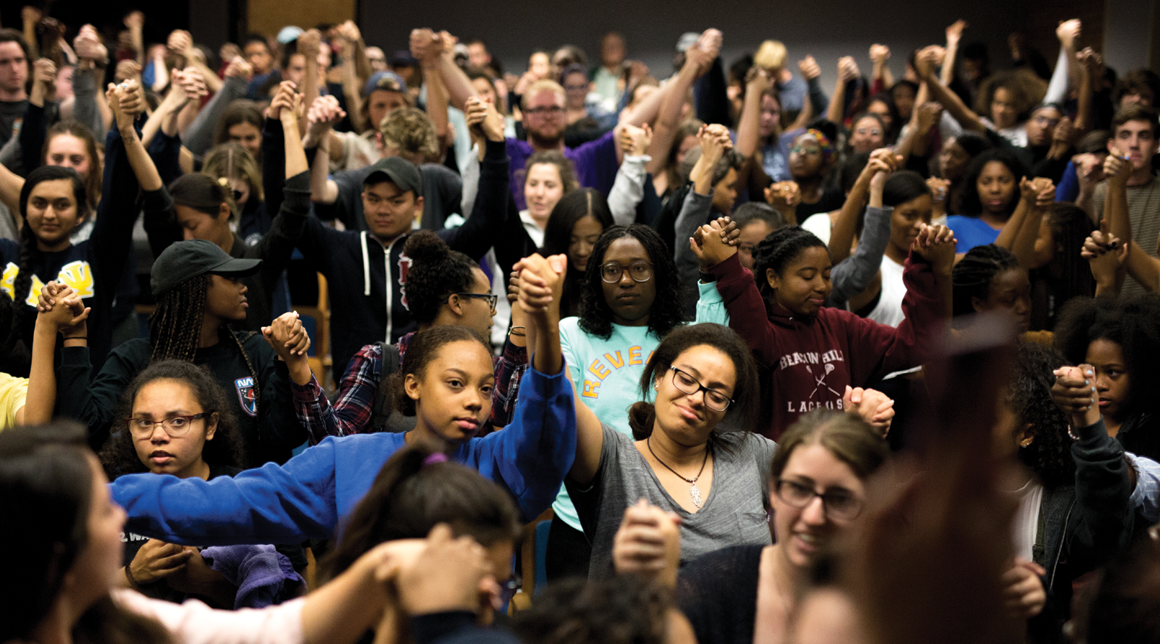
The committee for the Inclusive History and Images Project held its second open forum March 29, 2023, to mark its progress and share insights in what John Sebastian, vice president of Mission and Ministry, referred to as the “beautifully subversive” initiative that is digging deeper into Loyola Marymount University’s history. The committee was joined by about 30 faculty and staff members, and a student representative, to discuss the growth of the project, its significance, and explore future actions.
At the heart of the project is the effort to “remind the university of its commitments, of its mission, of its ties to social justice,” said Emelyn dela Peña, vice president for Diversity, Equity, and Inclusion.
Joe Bernardo, director of DEI capacity building, reported that the archive has grown to a curated collection that now includes 170 images hosted at the Hannon Library Digital Collection. A university-wide campaign, “There’s More to the Story,” included banners throughout campus and a semi-permanent display over several floors in University Hall. A campaign to get alumni submissions yielded a large number of photos and raised greater awareness of the project. A key component of the project is to collect oral histories of alumni and longtime faculty and staff members, Bernardo said. To date, 19 interviews have been produced and are in the process of being added to the IHIP website. With Professor Margarita Ochoa, he is teaching an independent studies course in the History Department titled “Oral History at LMU,” which is training students in this particular history method, and whose work is included in the archive.
Moderator and committee co-chair Dean Bryant Keith Alexander of LMU College of Communication and Fine Arts, noted that the impetus for the initiative was among a list of demands by Black LMU Students in the summer of 2020 that more rigorous efforts be made to include Black Indigenous People of Color (BIPOC ) students in the telling of LMU’s story. To that point, Ochoa said, “The oral histories and archive we’re creating is a powerful source that will now be available to LMU community and researchers beyond LMU, who can access these stories and write a history of different communities here in Los Angeles, at LMU, at universities. In essence, these stories now exist to complicate the history of LMU, to add richness, to add complexity where perhaps it didn’t exist before. The selection of these stories is in themselves telling a story of LMU from the perspective of the BIPOC communities,” referring to Black, Indigenous and people of color.
The project has received outside support from the Grace Nixon Foundation and NetVUE, the Network for Vocational Undergraduate Education. To that point, John Sebastian, vice president for Mission and Ministry, said, “It is wonderful to see us bringing our talents to bear on this project. The Netvue grant is titled “Reframing the Institutional Saga” and the goal is to incorporate the hidden histories into the official history and in some ways to subvert those official histories. It is a kind of beautiful subversiveness to be gathering up the parts of the story we didn’t know, but also challenging the received wisdom and understanding our story in a different way as we write the next chapters.”
Leonard King, the committee’s student representative and a junior journalism major, said he wants to be a bridge between IHIP and the student body. He was nominated to the committee based on his exemplary work in Hannon Library’s Archives and Special Collections where he was editing interviews for IHIP and Outlaw, LMU Loyola Law School’s LGBTQ+ student organization.
Part of the discussion explored the idea of placing representative historical images around the campus as a way of promoting the project and involving more university divisions.
Chancellor Michael Engh, S.J., professor of history and IHIP committee co-chair, said he has been impressed in his discussions with alumni groups. “They are very engaged and are asking ‘who is telling our story,’ and it’s so important for the university to get it right,” he said. “Gathering the information is important as well as interpreting the information.” Engh said that IHIP is based upon feedback from people and the insights that we learn, and that feedback will enable the committee to continue to develop the program.
“Everybody’s participation raises ideas and questions,” Engh said, “and it also affirms the direction which we’re going. In my heart, I know that we’ll be a better institution if we understand ourselves better and our history better.”
The next IHIP open forum is scheduled for spring 2024



